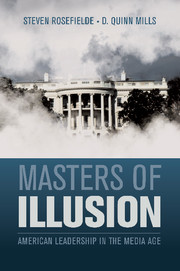Book contents
- Frontmatter
- Contents
- List of Tables and Figures
- Preface
- Acronyms
- Executive Summary
- Acknowledgments
- PART I NATIONAL SECURITY IN THE NEW AGE
- PART II AMERICAN PUBLIC CULTURE AND THE WORLD
- 3 “Smooth Comforts False” – The Illusions That Confuse Us
- 4 Towers of Illusion: Dysfunctional Behaviors
- 5 Mythomaniacs: The Sources of Our Illusions
- PART III AMERICAN PUBLIC CULTURE AND OURSELVES
- PART IV THE RECONFIGURATION OF NATIONAL WEALTH AND POWER
- PART V VORTEXES OF DANGER
- PART VI THE AMERICAN RESPONSE
- PART VII LEADING TOWARD PEACE
- PART VIII AMERICAN PRESIDENTIAL LEADERSHIP
- Notes
- Glossary
- Bibliography
- Index
5 - Mythomaniacs: The Sources of Our Illusions
Published online by Cambridge University Press: 31 July 2009
- Frontmatter
- Contents
- List of Tables and Figures
- Preface
- Acronyms
- Executive Summary
- Acknowledgments
- PART I NATIONAL SECURITY IN THE NEW AGE
- PART II AMERICAN PUBLIC CULTURE AND THE WORLD
- 3 “Smooth Comforts False” – The Illusions That Confuse Us
- 4 Towers of Illusion: Dysfunctional Behaviors
- 5 Mythomaniacs: The Sources of Our Illusions
- PART III AMERICAN PUBLIC CULTURE AND OURSELVES
- PART IV THE RECONFIGURATION OF NATIONAL WEALTH AND POWER
- PART V VORTEXES OF DANGER
- PART VI THE AMERICAN RESPONSE
- PART VII LEADING TOWARD PEACE
- PART VIII AMERICAN PRESIDENTIAL LEADERSHIP
- Notes
- Glossary
- Bibliography
- Index
Summary
Mere facts are worthless except through their interpretation.
Will Durant, The Life of Greece, pg. 615There is never a mere listing of facts, for they are too many and too confusing; they have no meaning without a context. What facts are chosen to be reported, and the interpretation which gives them meaning, are what public culture, the collective public mind decides. When the context is not accurate, as when it's distorted for partisan or commercial aims, then there can be no assurance that people understand what is really happening and that decisions can be made properly in response to events.
Media stories, especially on TV, are often so shallow, so carefully selected, so contrived, so subordinated to a predetermined story line, that they're not news at all, not even infotainment (because there's almost no information in them), but are merely entertainment posing as new reporting. Commentators choose hype instead of balanced reporting because they can't pen compelling headlines when interdependencies create gray zones instead of stark black and whites.
To justify such inferior communications, and to keep people interested, media executives and political activists create myths – stories that are compelling though not true or only partially true. In recent years, our public culture has passed into the hands of people who do this well – who are myth-builders, and many of us, avid consumers of myths in the disguise of information, have become mythomaniacs.
- Type
- Chapter
- Information
- Masters of IllusionAmerican Leadership in the Media Age, pp. 82 - 100Publisher: Cambridge University PressPrint publication year: 2006



